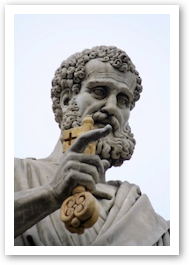The Papacy: The Ministry of St. Peter in the New Testament (2 of 3)
- ROBERT STACKPOLE
Students will understand that St. Peter was given a special pastoral ministry by Jesus Christ: that of Rock and Shepherd of the early Church.
 |
Scripture References: Acts 2:42; Gal. 1:18; Jn. 1:35-42; Mt. 16:13-23; Jn. 21:1-19; Jn.10:14-16.
Review last lesson:
- What was The Great Commission given by Jesus to His Apostles? ("Go therefore and make disciples of all nations.")
- How many Catholics are in the world? (1 billion 30 million approx.)
- What fraction of the world's population is this? (1 of 6)
- Was it Christ's intention that His Church be divided into many different denominations? (no, quote St. Paul, First Letter to the Corinthians 1:10)
- How many different denominations are there today? (approximately 21,000)
- What are the three major divisions of Christianity? (Roman Catholic, Protestant, Orthodox)
- Tell me something about the Eastern Orthodox, something about Protestantism?
- What does the word pope mean? (papa or father)
- How many popes have their been? (264)
- Why is St. Peter's Basilica in the Vatican important? (The main altar of St. Peter's was built over the tomb of St. Peter, symbolic of the fact that the Church is founded on the "rock" which is St. Peter.)
- What are some titles given to the pope? (Holy Father, Supreme Pontiff, Vicar of Christ, Bishop of Rome, Patriarch of the West)
LESSON DEVELOPMENT
I. The early Church pattern:
Virtually all Christians (Orthodox, Protestant as well as Catholic) agree: the Church in every generation should try to live according to the example set by Jesus' own apostles.
A. The early Church pattern: Read to the class Acts 2:42 (the apostle's "teaching," "fellowship," "breaking of the bread," "the prayers".)
What do these expressions mean? Remind the class that each of these aspects of the life of the early Christian community came originally from Jesus Himself.
Did the early Church as a whole have a chief shepherd or pastor? A hint can be found in Gal. 1:11-24: St. Paul, the greatest missionary of the early Church, went to Jerusalem, where all the apostles lived, to make sure he was teaching authentic doctrine – but who did he go to see above all? "Cephas?" (The Rock). A man named "Rock" was the leader or chief pastor of the early Church!
B. Our pattern now: includes each local church or parish having a pastor, or chief shepherd.
II. The significance of Peter's name:
A. How Peter received his name: (Read with the class Jn.1:35-42.)
- At their first meeting, Jesus gave Simon the fisherman his new name.
- Names were very significant to the ancient Jews, and a change in name often signified a change in role. In the ancient Semitic world, a name indicated a being's innermost nature or destiny. To give something a name, then, or to change its name meant to be able to know its inner nature, to govern it accordingly, and to determine its destiny.
- Suppose at the time of the apostles we were to give someone a new name: "slave"! What would that mean? What new role would he/she have to fulfill?
- Who in the old testament received a new name? (Abram becomes Abraham; Jacob becomes Israel).
- Simon's new name completely replaced the old: he was always known as "Cephas" (Greek transliteration of Aramaic "Kepha," or "Rock") or "Petros" (Greek for "Rock") by all the early Christians. These were not proper names in Greek.
B. Peter's special role of Rock – foundation and support o the early Church – is shown by another fact:
- Every time, in the whole New Testament, there is a list of the 12 apostles, Peter is always named first. Even though he was not the first apostle to be chosen (see again Jn.1:40-42), he is first among the apostles.
III. The ministry Jesus intended for Peter
A. Peter the Rock: (Read with the class Mt. 16:13-23)
Peter acknowledges that Jesus is the Son of God.
Jesus praises Peter in response, and outlines the special ministry He will give to him (in the future; it is all future tense)
- First: He makes a play on words: "You are Peter (Rock), and on this rock I will build my Church." In Christ's own native tongue, Aramaic, the two words would have been identical: "You are Kepha, and on this Kepha I will build my Church." Peter himself is the rock on which the Church will be built.
- Second: "the powers of death shall not prevail against it" (that is , the Church built on Peter). So Peter is to be a lasting foundation stone, a continual rock-support for the Church in every generation, not just in his own lifetime.
- Third: "I will give you the keys of the kingdom." The keeper of "the keys," in ancient Israel, was the chief deputy of the king, with authority to admit or exclude from the king's household, or capital city, whomever he wished, in accordance with the best interest of the king (eg., Is. 22:22). So, to be in the household of Jesus the "Christ" (the anointed Messiah-king) is to be there with Peter's recognition.
- Fourth: the authority to "bind" and "loose". Among the ancient rabbis, this phrase meant the authority to forbid and permit in the community of faith, including the teaching of God's law.
- Fifth: Peter's decisions to "bind" (forbid) and "loose" (permit) in the Church are to be ratified (backed-up) "in heaven." So heaven's guidance is promised to Peter for his authoritative decisions.
In short, Jesus promised to make Peter His key bearer – His chief deputy in the community of His disciples – and this would be so for every generation, with the support of heaven. In this way Peter's ministry would be the "Rock" of the Church.
B. Peter the Shepherd: (Read with the class Jn. 21: 1-19)
Jesus had promised to make Peter His chief-deputy in the future – here He fulfills that promise.
But how does He?
- Jesus had promised to make Peter His chief. He asks Peter three times "Do you love me?" (remember Peter's threefold denial, "Before the cock crows."). Jesus is giving special responsibilities to Peter, but in such a way that reminds him that he does not deserve any such thing. Peter's special ministry is founded on the mercy of Christ. Peter is a forgiven sinner, just like the rest of Jesus' disciples.
- Jesus says, "Feed my sheep" three times, because in ancient Israel the rabbis customarily used a formula of words repeated three times in the act solemnly transferring authority to someone in the community of faith.
- What is the flock of sheep that Peter is to tend? (Read to the class Jn. 10:14-16) Answer: the whole Church
- Have you ever seen a real shepherd with his flock of sheep? What does a shepherd do?
(a) Cares for his sheep – provides for them
(b) Protects them
(c) Leads them where they should go (out to pasture for food, and back to the sheepfold for safety) - So what was Peter to do? As chief Shepherd (or Pastor) under the Good Shepherd, to tend, care for, and lead the flock as Jesus would do. Provide for them, feed them with what? Protect them from what? Lead them – where? Discuss.
IV. The Petrine ministry today
A. Where can we find in the Church today a ministry like the one exercised by St. Peter?
Catholics claim it can only be in the "See" of St. Peter, Rome, from which the successors of St. Peter have always shepherded and strengthened the Church.
- Hand out (or display) pictures of the inside of the dome of St. Peter's Basilica in Rome. What words are written there? In Latin: "You are Peter?"
- Hand out (or display) pictures of the throne of St. Peter from the Basilica: what do the symbols mean? (the keys, shepherd's staff, the chair)
- The symbol of the dove: the Holy Spirit. When Jesus said to Peter "Blessed are you, Simon bar-Jonah (son of John)" this was significant because the name "Jonah" comes from the Hebrew for "dove." Peter is "son of the Dove" – in a special way, his ministry will be guided by the Holy Spirit, though he is an imperfect sinner, ever in need of God's mercy – the same is true for all his successors.
- The Catholic perspective:
"Christian generations do not exist as self contained islands. It is the same Church, whether we are talking about the first century, or the twentieth. Its essential character and activities persist. Peter's ministry is as much a part of its life now as it was and has always been throughout its history the Church will need its rock; it will need to be strengthened, and it will need to be fed." (Fr. Roderick Strange, The Catholic Faith, Oxford University Press).
Assignments:
- Read the Catechism, sections 880-882. How does the Catechism base the ministry of the Pope on the role of St. Peter in the New Testament?
- Read Karl Keating Catechism and Fundamentalism (San Francisco: Ignatius Press, 1988), Chapter 17: "Peter and the Papacy," p. 198-214. How does Mr. Keating answer the chief Protestant objections to the New Testament basis for the papacy?
- Find three pictures of statues or paintings of St. Peter. What do these artworks try to express about Peter and his ministry?
Watch the video "Saving Grace" starring Tom Conti. Discuss the distinction in the film between the Pope as a human being, struggling for spiritual growth and understanding, and the nature and burdens of his office.The Papacy
The Papacy: An Introduction (1 of 3)
The Papacy: The Ministry of St. Peter in the New Testament (2 of 3)
The Papacy: The Petrine Ministry in the Early Church (3 of 3)
 This is Meaghen Gonzalez, Editor of CERC. I hope you appreciated this piece. We curate these articles especially for believers like you.
This is Meaghen Gonzalez, Editor of CERC. I hope you appreciated this piece. We curate these articles especially for believers like you.
Please show your appreciation by making a $3 donation. CERC is entirely reader supported.

Acknowledgement
Robert Stackpole, S.T.D. "The Papacy: The Ministry of St. Peter in the New Testament (2 of 3)." Catholic Education Resource Center.
This lesson plan may be reproduced and distributed by any means as long as credit is given to the original author and to the Catholic Education Resource Center.
The Author
 Robert Stackpole, STD, is director of the John Paul II Institute of Divine Mercy. An American by birth, he earned a B.A. in History from Williams College in Massachusetts and a Masters degree in Theology from Oxford University in England. Robert was an ordained Anglican pastor before becoming a Catholic in 1994. He is the author of Divine Mercy, A Guide from Genesis to Benedict XVI and St. Peter Lives in Rome: An Anglican Discovers in the Ministry of the Pope, as well as editor of Pillars of Fire in my Soul: The Spirituatlity of St. Faustina. He regularly contributes articles to the official Divine Mercy website.
Robert Stackpole, STD, is director of the John Paul II Institute of Divine Mercy. An American by birth, he earned a B.A. in History from Williams College in Massachusetts and a Masters degree in Theology from Oxford University in England. Robert was an ordained Anglican pastor before becoming a Catholic in 1994. He is the author of Divine Mercy, A Guide from Genesis to Benedict XVI and St. Peter Lives in Rome: An Anglican Discovers in the Ministry of the Pope, as well as editor of Pillars of Fire in my Soul: The Spirituatlity of St. Faustina. He regularly contributes articles to the official Divine Mercy website.




